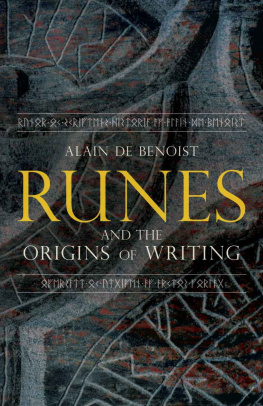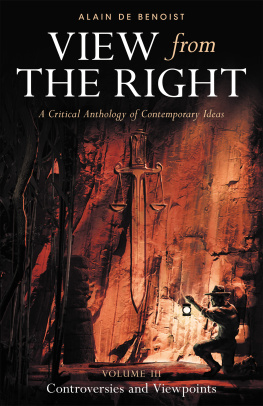Translated by Roger Adwan
Arktos
London 2018

Copyright 2018 by Arktos Media Ltd.
All rights reserved. No part of this book may be reproduced or utilised in any form or by any means (whether electronic or mechanical), including photocopying, recording or by any information storage and retrieval system, without permission in writing from the publisher.
Arktos.com | Facebook | Twitter | Instagram | Gab.ai
Original title
Vu de droite: Anthologie critique des ides contemporaines
(Paris: Copernic, 1977)
ISBN
978-1-912079-98-8 (Paperback)
978-1-912079-37-7 (Hardback)
978-1-912079-35-3 (Ebook)
Translator
Roger Adwan
Editor
Martin Locker and Roger Adwan
Cover and Layout
Tor Westman
Translators Preface
When it comes to politics, very few books ever manage to stand the test of time. This is because in an ever-changing world, most thoughts are revealed to be obsolete and are, more often than not, proven inaccurate and sometimes even completely wrong. This, however, does not apply to Alain de Benoists masterpiece, View from the Right . There are some, of course, who may still find themselves wondering whatand how muchreaders stand to gain from a book that was written more than forty years ago.
The global landscape has, after all, changed dramatically since its original publication and many, if not most, of the figures mentioned and quoted in it have long since passed away. Furthermore, what the educated Rightist seeks is a book that will contribute to determining his own position and role in our contemporary Western world, a world that now stands on the edge of an abyss. And yet, upon initiating the reading process, one quickly realises that View from the Right has lost none of its relevance and that the four decades that have passed since French readers first caught sight of its contents have failed to rob it of its undeniable significance.
Considering the fact that Alain de Benoist is known to have been one of the founders of the New Right, a movement that still exerts great influence upon the Rightist spectrum nowadays, it should hardly come as a surprise to anyone that View from the Right comprises the very thoughts and views that helped shape and define the movement itself. Far from being a mere factual description of past political realities, a political manual, so to speak, it delves deep into several other topics as well, all of which are expressed in a manner that renders their pertinence timeless. The themes range from political and social ones to religious and spiritual considerations and analyses; for being truly Right-oriented is synonymous with an entire mental disposition and cannot be restricted to a mere political inclination. And despite the fact that the author covers all of these subjects from a Rightist point of view, he succeeds in remaining quite objective throughout, which is a huge feat by any standards.
The result is a book that is intellectually stimulating and extremely thought-provoking and that will continue to fascinate readers for a long time to come. As for my translation of its contents, it should be noted that, regardless of how much the world has indeed changed since the late 1970s, I have chosen to retain the original information included by the author when penning the French text, so that 21 st -century readers may perceive the past through Alain de Benoists eyes and appreciate how much his great mind, which can only be described as having been genuinely ahead of its time, contributed to making the real Right what it is today.
Roger Adwan
Chief Translator and Editor
May 30, 2018
Systems
On Politics
The Great Political Ideas
Oswald Spengler used to complain that students were taught to dissect dead things. Into young people boiling with vigour, the nations future, one has instilled a taste for autopsy and cadavers, he wrote. And yet no mention is ever made of the worlds destinies, historical morphology, peoples in motion and Western civilisation.
The least that one could say is that the work authored by Mr Jean Rouvier (a professor at the Faculty of Law in Paris) on The Great Political IdeasFrom Their Origins to Rousseau is beyond any such reproach, as already confirmed by its chapter headings, which, among others, include the following: The Gentleman and the Intellectual, The Political Symphony, The Elite Man and the Assassins, and The Great All or Deception.
What could never have been more than a mere manual Rouvier attempted to turn into a fresco. His work does, however, remain open to the Orients political ideas.
The Resistance
The Egyptian pharaoh impacts his subjects in the very same manner that the sun affects the grains of sand in a desert: they are both a source of trituration. The sovereigns grip is absolute. Should the latter be loosened, anarchy would immediately spread. The Egyptian god-king is echoed by the Iranian one: This formula turns all subjects into slaves, and the latter must, at all times, proclaim their own slavery.
At the end of the 6 th century BC, Darius the Persian: He suddenly transforms autonomy into servitude and proceeds to increase the annual levy and impose garrisons that spread terror and surround tyrants whose establishment he thus generalises. Inverting the secular policy of the Lydian kings, the Great King, far from importing Hellenism into Anatolia, intends to export the entire Orient into Greek Asia.
A resistance soon surfaces. A revolt breaks out in 499, in Ionia. Rouvier states: Everything took place as if, beyond the obscure ventures of the tyrants ruling Miletus, this uprisingwhich enjoyed the support of all Athenian brethren- were the expression of a phenomenon of rejection stemming from any and every political graft that a certain ethnic group is unable to tolerate: in this case, the graft in question turned out to be the totalitarian formula imposed upon Westerners from the outside, acting as a permanent precept for people who were naturally inclined to embrace an entirely different current of political ideas, one that was characterised by balance and moderation.
On the other side of the Aegean, it is indeed under the sign of liberty, diversity and moderation that Greece, the outpost of the Occident, stood out.
The philosopher Heraclitus senseless disorder.
Solon, the great legislator whose archontate lasted from 594 to 592 BC, refused to resort to any sort of demagogy and declared: I dislike both the fact of remaining idle in the face of tyrannical violence and the fact of giving the good and the wicked an equal share of our fatherlands rich soil. This very principle would, at a later point, govern the Roman Republic.
Solon was then driven out by the mediocre and envious. Peisistratos tyranny would then state that it was under the latters rule that hereditary familial sacrifices were replaced by those where all men were accepted and the relations between men were conflated. Simultaneously, the greatest care was taken to shatter any and all previous associations.
The following statement was, however, made by Heraclitus, the theoretician behind the harmony of opposites: Provided that he is the greatest, a man is, in my eyes, worth 10,000 persons.
After Pericles, was once again unleashed, as hubris (or immoderation) triumphed within the ecclesia (the assembly). It is a time of terror, a period that witnesses the totalitarian dictatorship of a minority population practicing public majority voting. Drunk on blood and having excluded, through their uniquely repugnant presence and hideous violence, more than nine tenths of the citizens from the ecclesia , the scoundrels trample all rights underfoot.
Next page













